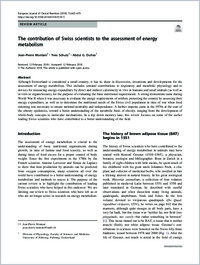The contribution of Swiss scientists to the assessment of energy metabolism
- Montani, Jean-Pierre Division of Physiology, Faculty of Sciences and Medicine, University of Fribourg, Switzerland
- Schutz, Yves Division of Physiology, Faculty of Sciences and Medicine, University of Fribourg, Switzerland
- Dulloo, Abdul G. Division of Physiology, Faculty of Sciences and Medicine, University of Fribourg, Switzerland
-
10.05.2018
Published in:
- European Journal of Clinical Nutrition. - 2018, vol. 72, no. 5, p. 665–679
English
Although Switzerland is considered a small country, it has its share in discoveries, inventions and developments for the assessment of energy metabolism. This includes seminal contributions to respiratory and metabolic physiology and to devices for measuring energy expenditure by direct and indirect calorimetry in vivo in humans and small animals (as well as in vitro in organs/tissues), for the purpose of evaluating the basic nutritional requirements. A strong momentum came during World War II when it was necessary to evaluate the energy requirements of soldiers protecting the country by assessing their energy expenditure, as well as to determine the nutritional needs of the Swiss civil population in time of war when food rationing was necessary to ensure national neutrality and independence. A further impetus came in the 1970s at the start of the obesity epidemics, toward a better understanding of the metabolic basis of obesity, ranging from the development of whole-body concepts to molecular mechanisms. In a trip down memory lane, this review focuses on some of the earlier leading Swiss scientists who have contributed to a better understanding of the field.
- Faculty
- Faculté des sciences et de médecine
- Department
- Département de Médecine
- Language
-
- English
- Classification
- Dietetics, nutrition
- License
- License undefined
- Identifiers
-
- RERO DOC 309523
- DOI 10.1038/s41430-018-0139-5
- Persistent URL
- https://folia.unifr.ch/unifr/documents/306706
Statistics
Document views: 99
File downloads:
- mon_css.pdf: 86
